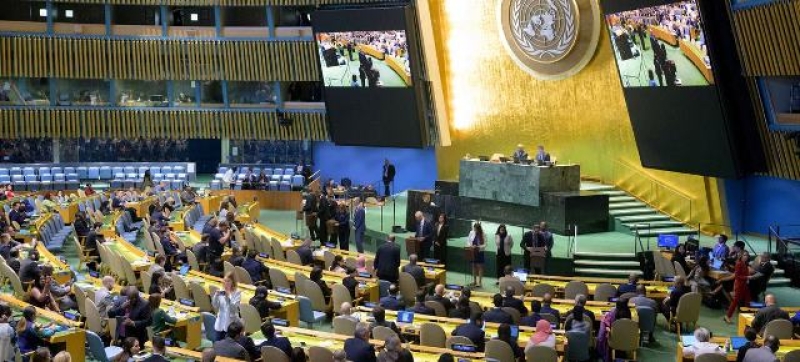- US Issues Travel Alert for Bangladesh Ahead of Election |
- Air ambulance carrying bullet-hit Hadi flies for Singapore |
- Can Dhaka’s arms recovery drive ensure peaceful polls? |
- ‘Unhealthy’ air quality recorded in Dhaka Monday morning |
- BD peacekeepers' deaths: UN chief calls Dr. Yunus, offers condolence |
Bahrain among 5 countries elected to serve UN Security Council

UN General Assembly elects five new non-permanent members of the UN Security Council. UN Photo-Manuel Elías
By Vibhu Mishra
3 June 2025 - Bahrain, Colombia, the Democratic Republic of the Congo, Latvia, and Liberia were elected on Tuesday to serve as non-permanent members of the UN Security Council, with two-year terms beginning in January 2026.
They will serve through the end of 2027 on the UN body responsible for maintaining international peace and security.
They will join the five non-permanent members elected last year – Denmark, Greece, Pakistan, Panama, and Somalia – who will serve through 2026. The incoming members will succeed Algeria, Guyana, the Republic of Korea, Sierra Leone, and Slovenia, whose terms end in December 2025.
The Security Council has 15 members: five permanent members – China, France, Russia, the United Kingdom, and the United States – who hold veto power, and ten non-permanent members elected by the General Assembly for staggered two-year terms.
Elections are held annually by secret ballot, with seats allocated by regional group. Candidates must secure a two-thirds majority in the 193-member General Assembly to be elected.
Vote tally
A total of 188 Member States participated in the election, which required only one round of balloting.
In the African and Asia-Pacific group, Bahrain received 186 votes, the Democratic Republic of the Congo (DRC) garnered 183 votes, and Liberia received 181 votes, with one country abstaining.
In the Eastern European group, Latvia received 178 votes while10 countries abstained.
In the Latin America and the Caribbean group, Colombia received 180 votes, with eight countries abstaining.
Debut for Latvia
Latvia will take a seat on the Council for the first time in its history.
With the exception of Latvia, all the elected countries have previously served: Colombia seven times, the DRC twice, and Bahrain and Liberia once each.
Regional groups
The non-permanent seats on the Security Council are distributed according to four regional groupings: Africa and Asia; Eastern Europe; Latin America and the Caribbean; and the Western European and other States group.
This year’s election filled five seats: two allocated to Africa, one to Asia-Pacific, one to Eastern Europe, and one to Latin America and the Caribbean. – UN News

